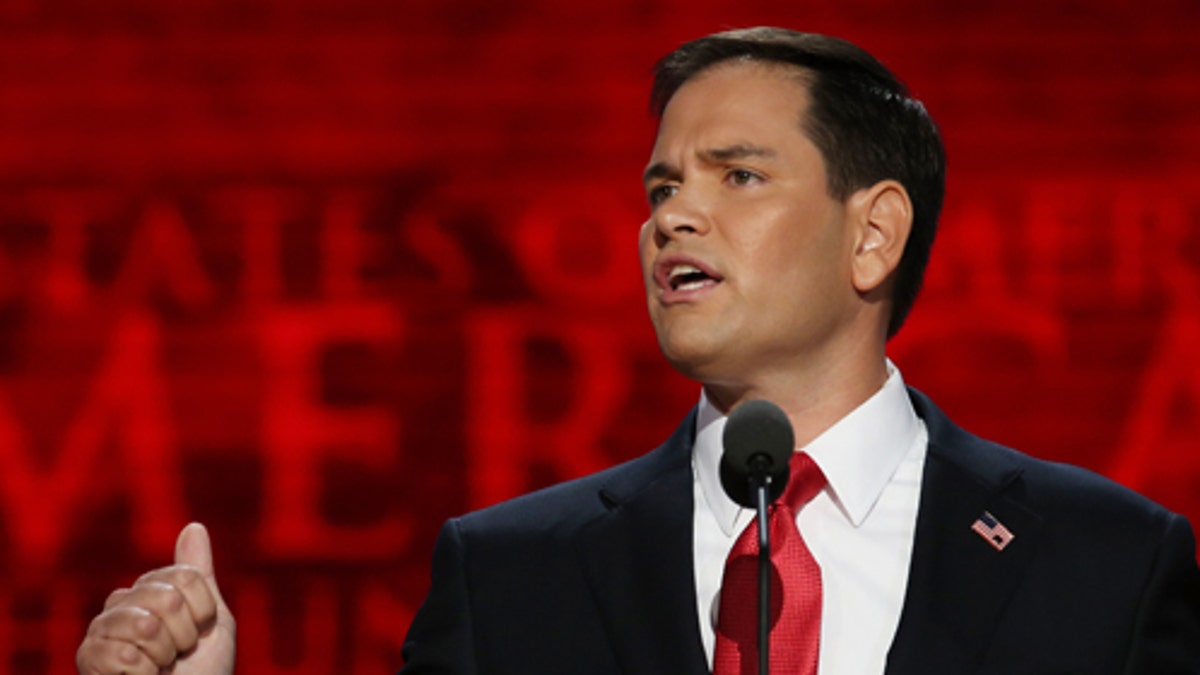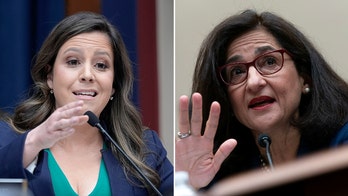
U.S. Senator Marco Rubio (FL) speaks during the final day of the Republican National Convention at the Tampa Bay Times Forum on August 30, 2012 in Tampa, Florida. (2012 Getty Images)
A fast-spreading emerging edict on what Republicans need to do to appeal to Hispanic voters is that they need – really need – Latinos in their party like Sen. Marco Rubio.
Many pundits and other political observers believe that if Republicans have more Rubios, and give them more of the spotlight, it will undo the off-putting image of the party as one of out-of-touch older, Anglo men who cannot empathize or sympathize with most Americans.
And with a Latino front and center, the emerging conventional wisdom goes, Republicans will cease to be written off by Latinos as being against them.
“If there's a winner tonight, it's the senator from Florida, Marco Rubio,” said conservative columnist George Will in a television interview on Election Day after President Obama was declared the winner, “because all eyes are now going to be turned to him as a man who might have a way to broaden the demographic appeal of this party."
But Latino leaders are saying: “Not so fast.”
The answer, they say, is not to trot out more Latinos to try to build good will, but to embrace and push for policies that address issues of concern to the voting bloc that is believed to have been pivotal to the president’s re-election.
Rubio, like some other Latino Republicans who have had high profiles in the last year, is a Tea Party conservative, and that – not his ethnicity – is what shapes Latinos’ view of him, political experts say.
Intensifying the visibility of Rubio and other Latino Republicans is “not enough,” said Clarissa Martinez, director of civic engagement and immigration at the National Council of La Raza, or NCLR, the nation’s largest Hispanic civil right group.
“We’re thinking that it’s tremendously important the that number of Latino elected officials in the Republican Party is growing,” Martinez said, but added that Republicans need to rethink policies that run counter to the interests of Latinos.
Like many other observers, Martinez said that all the Latino surrogates in the world will not lessen the negative impact among Latinos of Republican support for hard-line immigration policies, defeating Obama’s Affordable Care Act, and chipping away at government assistance programs that many Latinos rely on.
“The face of who delivers bad news does not change bad news,” Martinez said.
A poll released earlier this year showed that Republican presidential candidate Mitt Romney did not stand to gain additional Latino support even with Marco Rubio as his running mate.
The poll, released by Project New America and Public Policy Polling, of more than 1,000 likely Latino voters in Florida, Nevada and New Mexico examined whether Latino support for Romney rose with the possibility of a Latino on the ticket with the former Massachusetts governor.
The poll found that Latinos in all three states had too negative a view of Romney to be swayed by either Rubio, or Nevada Gov. Brian Sandoval or New Mexico Gov. Susana Martinez as potential running mates.
In Nevada, Hispanic voters preferred Obama and his running mate, Vice President Joe Biden, to Romney-Sandoval, 64 percent to 27 percent. Similarly, in New Mexico, Romney-Martinez had a low 28 percent of the Hispanic support, whereas Obama-Biden led with 65 percent.
In Florida, Obama was the frontrunner, and actually did better with Rubio on the ticket than without the Florida senator as Romney’s running mate. The PPP survey showed Hispanic support for Obama-Biden at 51 percent and a Romney-Rubio ticket at 44 percent.
The poll was a clear indication -- even months ago -- that the Republican Party had to find a new tactic to gain the support of the Hispanic vote because for Hispanics, the presidential race would "come down to who can best communicate with the Hispanic community on the value and issues that matter most to them,” Jason Leon, National Outreach Director for Project New America concluded.
By the time Romney became the inevitable GOP presidential nominee, after the Republican primary, he had taken on the mantle of ultra-conservative on immigration issues. Immigration became the issue on which the candidates in the GOP primaries competed to show who was the "true" conservative.
But while they were appealing to their conservative base, they were alienating many Latino voters – a tactical error from which the party would not rebound, experts say.
Roughly 50 percent of Latino voters cast their ballots, comprising 10 percent of Tuesday’s turnout. That exceeded the record set in 2008, when Latinos made up 9 percent of all voters.
Exit polls show that 71 percent of Latino voters chose Obama, compared with just 27 percent who picked Romney. That marks the widest gap in Latino support between two presidential candidates in recent history.
“That is not an intrinsic ethnic affinity problem, it is a policy problem,” said conservative pundit Charles Krauthammer on television after Romney’s defeat. “The Republicans are -- Romney ran right of Rick Perry in the primaries on [immigration]. He never recovered.”
Rubio and Martinez have called for some flexibility among Republicans on immigration, but their stances are still considerably to the right of most Latinos.
“With Hispanics, it’s not really about Democrats or about any one party,” said Rudy Lopez, the political director for the Campaign for Community Change, a non-profit social justice group in Washington D.C. “It’s about the issues they care about -- jobs, health care, and the connective issue is immigration.”
“We’re calling on Republicans for their show of good faith and good will,” Lopez said. “If they want to connect with us, they need to prove something, in tangible ways. We need Latino-friendly policy, not just brown faces.”
On issues watched by many Latino voters, Rubio has taken a decided hard line.
He opposes immigration reform measures that do not prioritize securing the borders and strictly enforcing laws already in place. He supports English as the country’s official language, and has praised Arizona’s controversial immigration enforcement law, parts of which were upheld by the U.S. Supreme Court. He also opposed the nomination of Sonia Sotomayor to the Supreme Court.
Martinez has opposed driver’s licenses for undocumented immigrants in her state, and both she and Sandoval have expressed support for Arizona’s immigration law, which requires local and state law enforcement to check the immigration status of people they stop and have reason to suspect are here illegally.
And Sen.-elect Ted Cruz, of Texas, is a Tea Party favorite who wants to reinforce the U.S.-Mexico border fence and holds hard-line views on immigration.
The New York Times said: “He is expected to join Senator Jim DeMint of South Carolina and other Tea Party icons as an uncompromising irritant of mainstream Republicans and Democrats alike.”
Rubio and Martinez, to be sure, publicly cautioned Republicans to watch their rhetoric on immigration – particularly their unsympathetic tone on what to do with the undocumented – and urged them instead to shift their focus to legal immigration when discussing the issue.
In an interview with Fox News Latino earlier this year, Rubio said the GOP’s message to Latinos about how Obama’s failed economic policies had hurt their community could not drown out the anti-Latino tone that many in the party had adopted.
“It’s very hard to make the economic argument to people who think you want to deport their grandmother,” Rubio said.
Other Republicans agree.
“If Republicans are perceived as hostile, Hispanics are not going to listen to the rest of the messages,” said Bob Quasius, president of Cafe Con Leche Republicans, which favors comprehensive immigration reform.
Rubio floated around the idea of a restricted version of the DREAM Act that would grant a conditional type of legal status – but not open a path to citizenship - to the children of undocumented immigrants.
But ranking Republicans in Congress expressed doubt that Rubio’s measure would get the support of their party’s most die-hard conservatives. And Rubio abandoned the plan after Obama announced an initiative that would suspend deportation for two years for undocumented immigrants brought as minors to the United States.
Angelo Falcon, president of National Institute for Latino Policy in New York, said it’s anyone’s guess whether Latino Republicans such as Rubio and Martinez will keep reflecting conservative views that alienate most Latinos, or whether they will modify their positions.
“It’s hard to tell what role they’ll play in the Republican party,” Falcon said, “whether they’ll move the party in a more reasonable direction. We don’t know if Rubio takes a hard-line right-wing position because that is what presented him with certain political opportunities in the party."
"If that’s the case, and the party decides it has to soften its line, maybe Rubio also will soften his to keep those political opportunities for himself.”
But Latinos, Falcon said, shouldn't spend their time discussing Republican attention to their issues, and should instead step up pressure on Democrats and the Obama administration.
Democrats and the Obama administration, Falcon said, have been a disappointment to Latinos on many levels.
"We have to hold the Democratic party accountable," Falcon said. "Latinos are not in good shape with the Democratic party. Not enough Latinos are in leadership positions with the party. Democrats get away with murder."




